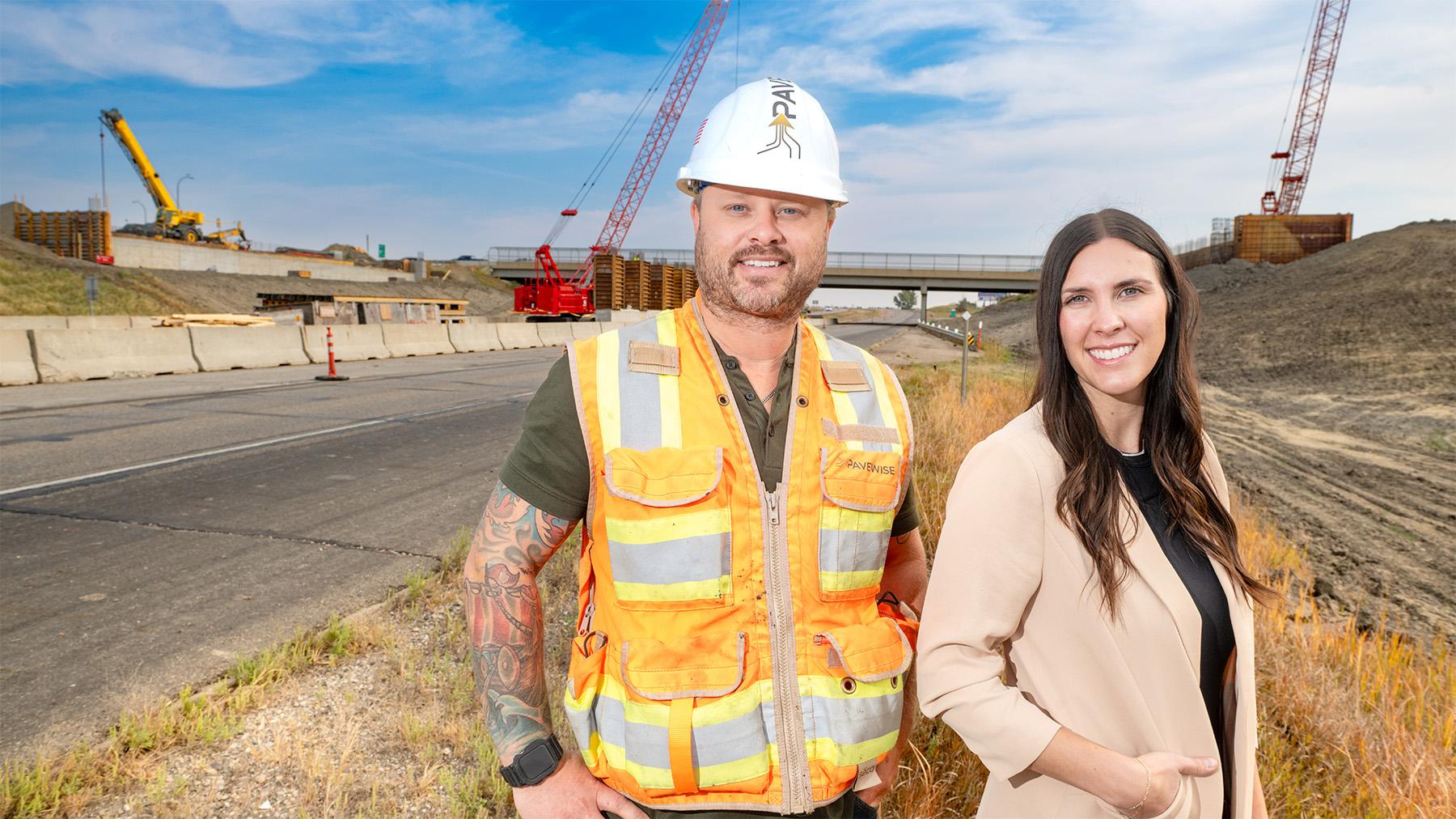Paving the Way for Hope

Bryce and Brittany Wuori
Class of 2013 and 2014
As young entrepreneurs, Bryce and Brittany Wuori spent a decade building several brick-and-mortar businesses from the ground up to establish their livelihood.
It was their bread and butter. Their financial security.
But it wasn’t enough for Bryce.

As a third-generation construction worker and owner of his own construction business, Bryce, ‘14, has worked on projects from building construction to asphalt paving. He has always been a problem solver by looking beyond the nuts and bolts of a job, and he sees how technology can improve production.
“I’ve always come up with the crazy ideas,” Bryce said. “It’s just kind of the way my brain has always worked. I’m very good at identifying how the process can be improved. I love data.”
To Bryce, there was something underneath the asphalt and construction numbers. As a result, the seed of inspiration for the Bismarck-based Pavewise took root.
Bryce used his Master of Project Management degree, and Brittany tapped into her knowledge of business to design a web-based construction tech software program. It’s designed to maximize productivity at a paving job site and to enhance quality in the road construction industry. The software manages important variables, from weather conditions to project specifications and equipment operations, to keep projects on time, on budget, and more efficient.
It's like a foreman’s virtual assistant.
Pavewise has been involved in projects totaling more than $1 billion, encompassing numerous road construction projects in 10 states and 26 international airports across the country.
“We picked up like six or seven contractors we're working on in Florida right now because they get impacted so heavily by rain and weather,” Bryce said. “It fills my cup as an entrepreneur. I want to build things that help and solve real-world problems. So, when they relay that on to us, that just makes us much more motivated to keep building.”
Brittany, the company’s chief operations officer, believes her education at Mary has served her well. “The nursing program didn't just teach clinical skills,” Brittany said, who graduated from Mary in 2013 with a degree in nursing. “They helped form the building blocks of the leadership, adaptability, and resilience that I have and that I need. So, you can do a lot with a different degree and go from health care to construction.”
Pavewise currently has eight employees, four of whom are Mary graduates.
Convincing contractors to accept a new technology has been a hard mindset to change. “Our biggest hurdle right now is changing behaviors,” Bryce said. “There’s this persona in construction that it’s always been done this way, and if it’s not broke, don’t fix it. It’s getting these individuals to trust the technology that is replacing something that they used to do with the traditional method.”
Bryce describes how the automated system can save them critical time, money, and stress. Gone will be the day of debating whether to send a crew to a job site and then have to pay them as they sit in their trucks during inclement weather.
The company has since added GroundTruth to the software. The new application broadens Wuori’s effort to improve asphalt paving production and extends to the entire construction industry. Bryce developed a hyper-local weather station, which is certified by the Environmental Protection Agency. It provides contractors with real-time weather data to make proactive weather decisions at the job site.
As the company and the patent-protected software take off, Bryce has turned his attention to an issue that has deeply impacted him and others in the construction industry. The Wuori’s want to remove the stigma associated with mental health and reveal the human side of construction.

“There’s a mental health crisis in construction,” Bryce said. “You’re away from home with lots of long hours. It’s hard work with long days. This stress is way different, and it’s more so because you are always trying to please somebody else.”
He knows what he’s talking about.
The demands and daily pressure of making individual financial decisions costing tens of thousands of dollars on multimillion-dollar projects wore him down to the point of a mental collapse.
“Eventually I found myself in a very dark place,” Bryce said. “I was the most successful I've ever been in my life, growing multiple businesses and more money than I could ever dream of. But I was very, very depressed inside. I had great mentors growing up. I work with my dad and grandpa, but they never taught me how to express the way it felt. So, I kept it inside. And like a switch, it eventually caught up with me. I always thought I was with control.”
Brittany found herself taking on the difficult role of caregiver.
“I was the nurse trying to help fix him,” Brittany said. “I could help patients, but I was struggling to help my own husband.
His need to escape the overwhelming pain and despair nearly won.
“And then just like a snap of fingers, one evening I decided I don't like the way I feel, and I don't think I want to feel like this anymore, said Bryce. “I still remember that day. It was over 7 years ago, and luckily, it never happened. If I didn’t have the support system and the people who guide me shine that little bit of light, I wouldn’t be here speaking today.”
It worked, and now Bryce is sharing his experience in an effort to remove the stigma and normalize the issues of mental health.
Bryce cites that the construction trade has a five times higher rate of suicide than other industries. “A lot of it is because this industry is not normalizing it. We don't talk about it. We don’t know how to deal with feelings, we’re rough, we’re tough, we have tattoos, and we work hard. We just shovel through it. That needs to change.”
According to the Centers for Disease Control and Prevention, an estimated 6,000 construction workers died by suicide in 2022. That’s four times the general population compared with 1,000 deaths due to work-related incidents.
“This industry is a high-stress environment,” Brittany said. “This was my project. We're trying to help the industry with it, even though we're not specifically designed to do this. We're still filling our cup.”
The Wuori’s are taking a proactive approach to the issue determined to make inroads to an industry known for its masculine behavior and hesitancy for change.
As part of their effort to raise awareness, Bryce is sharing his story along with solutions for mental health issues to industry professionals and the public. He recently spoke at the North Dakota Suicide Prevention Coalition's annual conference and at a Mental Health America of North Dakota gathering.
Brittany created a small handout, “Mental Health Matters in the Construction Industry,” with a list of recommendations to assist contractors and their employees. The list compiled ranges from communicating and connecting with workers to balancing workloads and enrolling in mental health training to better support foremen and workers. The handout is included in the software.
“We need to normalize mental health,” Bryce said. “It's been my mission over the last year, since I started to talk about this. Nobody knew this happened to me for over six years until I finally realized and saw people going a little bit farther than what I did. This has to change its history. I'm just advocating as much as I can to talk about it and be that light for other people who need it at that time.”
If you or someone you know is in crisis, call 988 to reach the Suicide and Crisis Lifeline.
